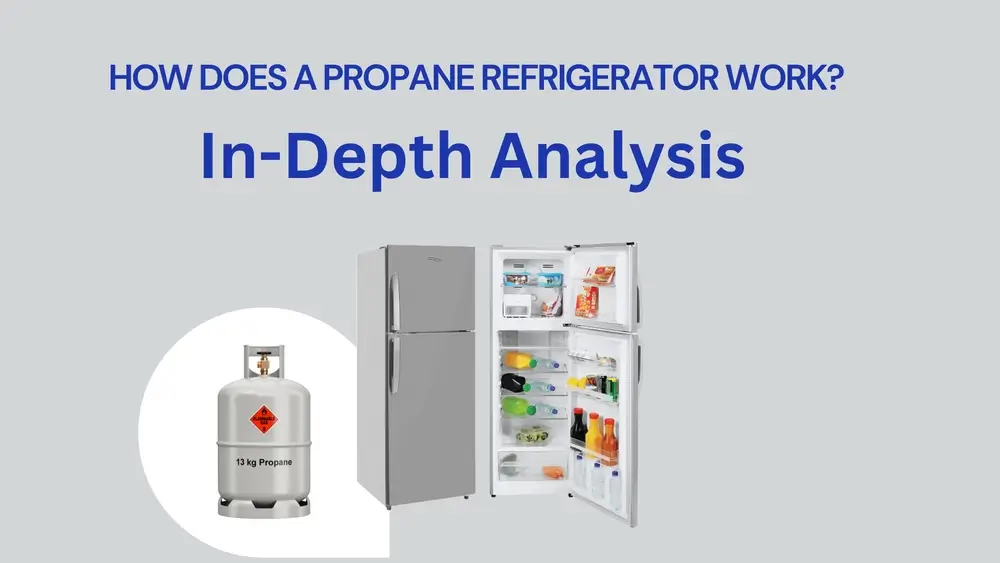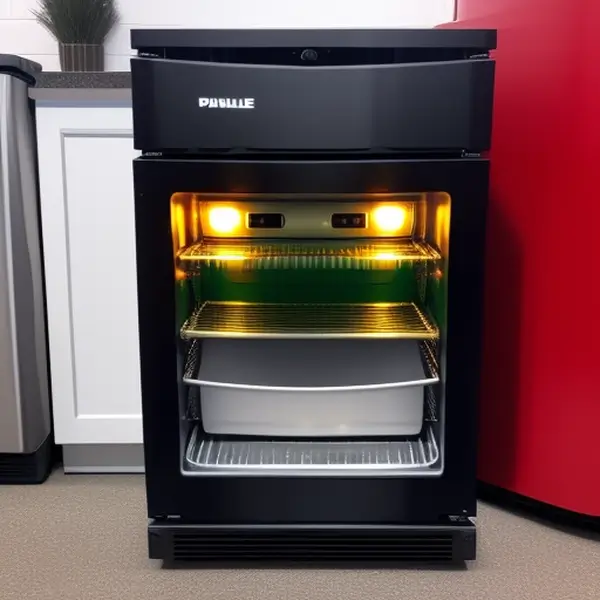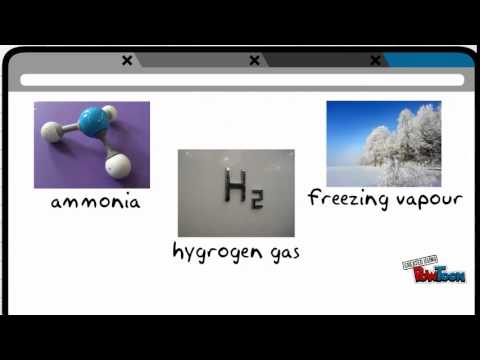Is your electric refrigerator giving you a hell of a Conclusionlife because of its high maintenance, but you don’t know how does a propane refrigerator work? Are you planning to replace your electric refrigerator with an appliance that would rather be – comparatively more energy-saving with minimal maintenance yet better fuel economy?
Nope, we aren’t really kidding, nor are we making you daydream. It’s high time we welcome you to the world of propane refrigerators! So, how does a propane-powered refrigerator work, and is it safe to use? Well, you’ve come to the right place to broaden your horizons. So, grab a seat and keep reading.
Table Of Contents

How Does A Propane Refrigerator Work?
As you can already guess from the name, a propane refrigerator uses propane as the fuel source to burn and generate energy for operation instead of any electricity. It’s similar to an RV refrigerator that can run off propane, which is also a great option to consider if you’re camping in the woods with your friends and family and need a cold storage place to keep your foods and drinks in good condition.
So, how does a camper refrigerator work off propane when you’re outdoors? But before we dive into that, let’s get you equipped with some basic knowledge about the different parts of a propane fridge.
Main Components of a Propane Refrigerator
We will discuss and analyse the main components that are responsible for the functioning of the propane refrigerator. You will gain a detailed understanding of the various parts, including the compressor and condenser, which are essential for ensuring that the appliance operates efficiently. So take a deep dive into the fascinating world of refrigeration technology and explore the many components that make this important appliance possible
- The main three substances that chemically react to each other inside are hydrogen gas, water and ammonia.
- Like every other refrigerator, a generator is involved, which is responsible for generating ammonia gas in the case of a propane refrigerator.
- Next up, we have the condenser, where the ammonia gas is processed to form liquid ammonia.
- The ‘separator’ also does a fantastic job of separating the different elements from each other when necessary.
- There’s also an evaporator that’s there to convert liquids into their gas form. Then lastly, we have a mixing tank where ammonia gas and water absorb each other to form a single element.

Energy Generation of a Propane Refrigerator
Inside a propane fridge are different pipelines and chambers containing the three main elements – water, hydrogen and ammonia. After the generator turns on to create ammonia gas, it is mixed with water to create a solution of ammonium hydroxide and then heated with the propane flame.
After the solution gets hot enough to start boiling, the ammonia gas, because it has a lower boiling point than water, will start rising to the condenser, condensing it into saturated liquid ammonia under high pressure and low temperature.
Cooling System of a Propane Refrigerator
Unlike your typical kitchen refrigerator, a propane fridge does not use compression technology for cooling and refrigeration. Instead, it’s more like a heat extraction, also known as the Electrolux cycle.
Basically, after the anhydrous ammonia flows through the tubes into the evaporator, it comes into contact with hydrogen gas and creates a cooling effect. Now that the ammonia has regained its gas shape, it will pull energy from the surroundings and merge with water to form an ammonium hydroxide solution, leaving off the hydrogen gas, which goes back to the evaporator and rises again. The whole cycle is repeated, and the process continues till the refrigerator is turned off.
Pros of a Propane Fridge
Compared to a regular electric refrigerator, a propane fridge is so much more energy efficient and excellent in the following ways:
- It can produce double the energy in a given period.
- Power outages during natural disasters or typical load shedding will not stop your refrigerator from running and operating smoothly.
- Gases, in general, like propane, are more efficient in producing heat than electricity.
Cons of a Propane Fridge
Before you make up your mind about purchasing a propane refrigerator, there are certain risk factors that you should keep in mind to be safe than sorry:
- There’s a potential risk of ammonia exploding when in contact with other gases and when ignited. A propane fridge is more at risk of fire hazards than electric refrigerators.
- Propane refrigerators are costlier than electric refrigerators. In fact, propane itself is expensive to buy.
- Possible leakages in the refrigerator propane tank or hydrogen gas pipelines.
How to Maintain a Propane Fridge?
To ensure your propane fridge works efficiently and safely, you need to maintain it regularly. Here are some tips on how to maintain your propane fridge:
- Check the propane burner for signs of wear and tear and clean it if required.
- Keep the condenser clean and free of dust and debris.
- Check the propane supply and regulator for leaks and replace any damaged parts.
- Inspect the seals on the fridge door to ensure they are tight, and replace them if necessary.
- Keep the fridge level to ensure proper operation.
Conclusion
Propane refrigerators are a great alternative to electric ones for homes or off-grid cabins. Off-grid residents can benefit from their energy efficiency, reliability, and cost savings. Follow our maintenance tips to ensure that your propane fridge will operate efficiently and reliably for many years.
